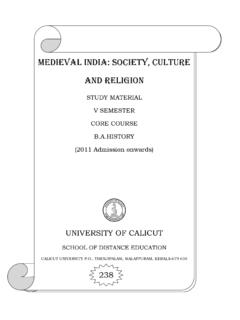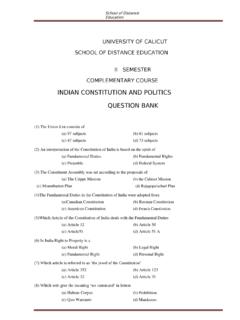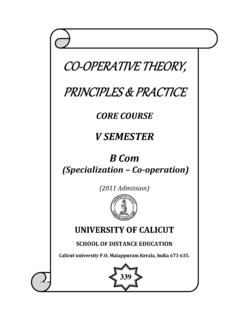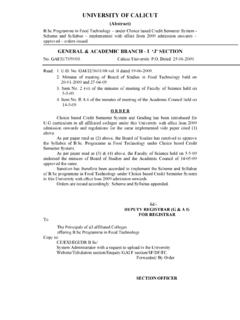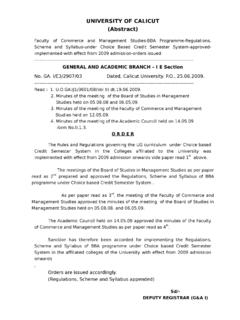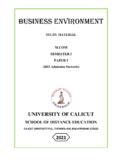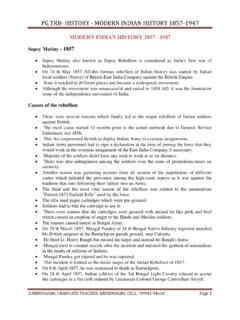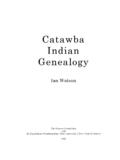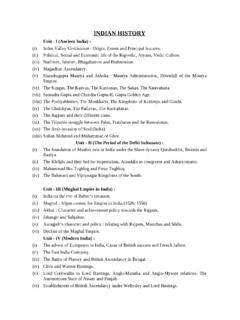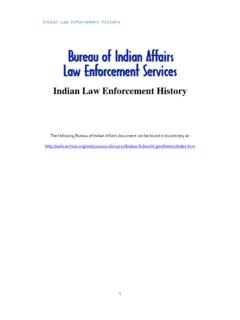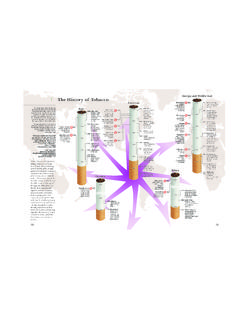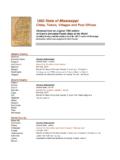Transcription of MAKING OF INDIAN NATION - University of Calicut
1 MAKING OF INDIAN NATIONV SEMESTERCORE COURSEBAHISTORY(2011 Admission) University OF CALICUTSCHOOL OF DISTANCE EDUCATIONC alicut University ,Malappuram Kerala, India673 of Distance EducationMaking of INDIAN Nation2 University OF CALICUTSCHOOL OF DISTANCE EDUCATIONSTUDY MATERIALCore CourseBAHISTORYVS emesterMAKING OF INDIAN NATIONP reparedby:Sri. ,Associate Professor,DepartmentofHistory,Govt. College, by:Dr. N Padmanabhan,Associate Professor,PG Dept. of history , , Madayi, Payangadi, PIN 670 358,Kannur (Dist).Layout:Computer Section, SDE ReservedSchool of Distance EducationMaking of INDIAN Nation3 CONTENTSPAGE INDIANHOOD5 UNITIIECONOMIC AND POLITICALMANIFESTATIONS OFCOLONIALISM39 UNITIIISTRUGGLES AGAINST COLONIALSTATE90 UNITIVNATIONHOOD-REALITY143 School of Distance EducationMaking of INDIAN Nation4 School of Distance EducationMaking of INDIAN Nation5 UNIT-IEVOLUTION OF INDIANHOODM ajor HistoriographicalTrendsThe study of history as a properly developed discipline in a scientific,ordered and systematic way began only in the 19thcentury.
2 It was only thenthat the historians tried to absorb the lessons of early historical writings andcould develop new methods and techniques. It was during this venture toknow the art of historical writing of the earlier period did historiographyemerged as a part of history . Historiography simply means the history of theart of historical writing. In other words, it is the history of history or thehistory of historical thought. As we know the colonial modernity and knowledgewhich brought a historical sense to indians . Systematic historical writing beganin India during the early period of British colonialism. The earliest and one of thepositive results of British conquest was the recovery of ancient INDIAN history onmodern lines of historiography.
3 It was essential to them to know about the past,society and culture, and establish their authority over India. It was an outcome ofthe administrative necessity of the Britishers also. The rulers encouraged thosewho shown interest in the past, resulted the investigation of the past andbringing up of new interpretations and perceptions on INDIAN INDIAN historiography began with the writings of the scholar-administrators of the English east India Company and they found history as aninstrument to legitimise the colonial rule by put MAKING emerged different school of thoughts or historiographicaltrends in INDIAN history . They are colonial or imperialist, nationalist, Marxist,Cambridge, and or imperialist historiographyIt was the product of the British colonialism inIndia.
4 In modern Indianhistory, the school or tradition of history writing which was influential in the late19thand 20thcenturies. Many intellectual influences co existed in this indologists and orientalists were the real force behindthe development ofsuch enquiry. They laid the foundation for the development of the investigationon India s past and culture. These colonial writers upheld different ideologies intheir writings that are the Utilitarians, the Evangelicals and the of Distance EducationMaking of INDIAN Nation6 The utilitarian utilitarian school of political philosophy was started by JeremyBentham in England. It was a bye product of the enlightenment of Europe. Theutilitarians stood for that the power vested within thehands of the rulers mustbe utilised for the benefit of the society.
5 The utilitarian was another schoolheaded by the James Mill who believed that the backwardness of the Indiansociety could only be improved through the introduction of enlighteneddespotism. HisHistory of British Indiawas the most dominant historical workamong the Britishers during the 19thcentury. It was published in the year 1828,became a trend setter for the subsequent historical works produced by colonialwriters .and the most controversial too .He never visited India and it was thefirst comprehensive history on India in the modern period. It covers the history ofIndia from the beginning of the Christian era to the 19th century. He dividedIndian history into three separate periods, namely, Hindu, Muhammaden andBritish.
6 It was a deliberate attempt by him to designate the ancient and medievalperiods of INDIAN history as Hindu and Muslim .He skilfully avoided designatingthe modern period as Christian, instead he used the termBritish. Thisperiodisation was used by the subsequent colonial historians. In fact it was therecognition of the divide and rule policy of colonial authorities in India. Thebeginning of the both the imperialist and communalist historiography, anddistorted and vested interests presentation of history for the colonial evangelical evangelical historians INDIAN history written by them should be seenin relation to their attitude to INDIAN religions, particularly Hinduism-two suchattitudes one of hostility and one of sympathy.
7 During the 19thcentury theywere following or having hostility towards India but later their attitudes becomesympathetic. They were the missionaries came to India in order to convertIndiansand they even believed that god had allowed them to conquer the countryfor this purpose. The main theme of their historical writing was better criticism ofall INDIAN things and an uncritical justification of all British rules. They believedthat the people of India could only be changed progressively throughChristianity and missionary education: Thus stressed on the conversion ofIndians to Grant was the prominent evangelical writer in this period, his workObservationon State and Societypublished in 1813emphasis on thebackwardness of this country was due to the Hindu religion.
8 According to himthe only solution to put an end to this backwardness was the acceptance ofChristianity by the indians . According to him by the introduction of EnglishSchool of Distance EducationMaking of INDIAN Nation7language falsehood could be weakened and variety must be flourished. To themBritain had an important function to fulfil in the history of India and it was apart of some divine industrial revolution and the spread ofProtestantism were also causedfor the evangelism in India. William Wilberforce was forefront in this new evangelism contributed two things that is combined religion with scienceand they gave kind of emphasis on science. A large number of mission societiesappeared in India after lassen extended the philosophy inaugurated by Grant.
9 His workis entitledIndian antiquities, 4 volumes, in which tried to examine the generalhistorical background of the INDIAN sub continent from the early period itself. Heattempted tolerate INDIAN history with the dominant philosophy of the 19thcentury Europe, namely, the Hegelian dialectics. By this he was trying to relateIndian history with the general stream of the European philosophy administrative administrative historians were another category for the developmentof historical writing in India. They wrote on as a part other official duty. Sothese writers were mainly used the official records and reports for their these were a one sided view on history in general. The importantadministrative historians were V,A.
10 Smith, who produced several works onIndia, ,Macaulay, William Wilson Hunter, B Malleson ,Henry Maine, , Alfred Lyall, , , James Tod,Mark Wilks,Grant Duff, Robert Orme,T. R Holmes, , John Dawson, , , Sir Wolsely Haig, Elliot opened up new chapter in the historical writing in influenced thehistory of writing India as well as the European history writing on and attitudes which led to the emergence of nationalist, a nativehistorical writing in India, a reaction against to colonial distortion of historiographyThe 19thcentury British historians played a crucial role in provoking anationalist reaction. This reaction came in the form of a nationalist approach inhistoriography. An important element in this approach was an effort to restorenational self esteem and the glorification India s past.

